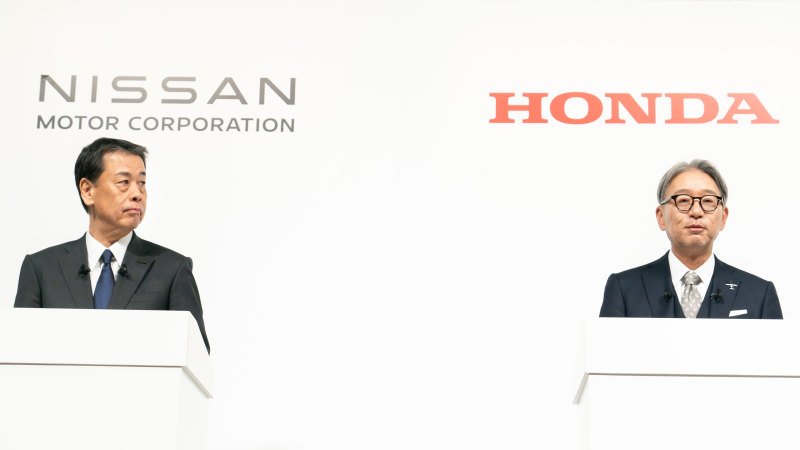Like the driver who stubbornly insists they know where they’re going but ends up lost, pride may have caught up with Nissan when it shelved its tie-up with Honda.
Like the driver who stubbornly insists they know where they’re going but ends up lost, pride may have caught up with Nissan when it shelved its tie-up with Honda.
Opinion
By Gearoid Reidy
February 6, 2025 — 11.01pm
Like the driver who stubbornly insists they know where they’re going but ends up lost, pride may have caught up with Nissan Motor Co.
Now, the Japanese automaker might be stranded in a place where even roadside assistance can’t reach it. News reports on Wednesday said Nissan has withdrawn from the agreement to combine with Honda in a $US60 billion ($97 billion) deal, just over a month after the two firms formally entered talks on what would have been a historic merger.

The sticking point appears to be Nissan’s demand that the merger be one of equals despite Honda having a market capitalisation more than five times its size. Honda, in turn, had proposed first turning Nissan into its unit, the reports said, ostensibly to quicken the pace of restructuring at the troubled firm — a proposal unlikely to have gone down well with executives at a company that traces its roots back to before World War I.
There was already good reason to suspect the deal had been foisted on Honda. Both companies pitched it as necessary to “maintain global competitiveness”, one that would have created the world’s third-largest carmaker.
But when chief executive Toshihiro Mibe was asked in December what was attractive about teaming up with Nissan, he struggled to answer – responding, “Er, that’s a tough one …” and unable to contain a nervous laugh.

Many, including Carlos Ghosn, the one-time chief executive turned fugitive, felt the hand of Japan’s powerful Trade and Economy Ministry to prevent one of the country’s most iconic companies from falling into the wrong hands, especially when stories surfaced over foreign interest.
The two firms stopped short of confirming reports on Wednesday, leaving some hope that a deal might yet be salvaged. But they acknowledged that discussions about calling off the merger were true.
Loading
Advertisement
At that December press conference, following his long moment of hesitation, Mibe eventually alighted on an answer that highlighted the Yokohama firm’s long history and tradition. In recent years, Nissan’s main tradition has been disappointing investors. If the merger collapses, it will join a long list of failed initiatives – from talks to combine with its largest shareholder, Renault, to bids to electrify its fleet – that was intended to reboot an automaker that has stalled.
Ghosn’s years of cost-cutting left the automaker trailing in R&D in both electric vehicles and hybrids. Nissan needed this deal a lot more than Honda. As billions of dollars of debt due in the next year close in, the former may get pushed into an even less favourable deal. (Recall the reports that Hon Hai Precision Industry Co, better known as Foxconn, was interested in snapping it up, with the Taiwanese firm likely intending to take over Nissan’s manufacturing bases in its push to make cars like it produces iPhones.)
And the growing band of activist investors, including Effissimo Capital Management, won’t be happy – and have a history of causing boardroom headaches until they get what they want.
Honda shares cheered the news, with the prospect of a merger with a failing company having underwhelmed investors since the talks surfaced.
But perhaps they shouldn’t celebrate too soon; Honda also needs to grow to succeed. That these reports came the same day as Toyota – the world’s best-selling automaker for five years running – raised its sky-high profit forecasts even higher was another irony.
Failing to come to merger terms, particularly with a prideful junior partner down on its luck, is a common theme in attempted Japanese mergers. But putting off painful but necessary steps to save face hasn’t ended well for many Japanese firms, much less so for ones in sectors moving as quickly as the auto business.
Loading
It might just be brinkmanship. And it’s not impossible that things might turn around. Previous mergers that didn’t come to pass, such as the mooted combination of industrial conglomerates Mitsubishi Heavy Industries and Hitachi, didn’t necessarily end up as disasters; both companies are now doing better than ever, having reformed their operations independently.
But having taken a wrong turn, heading further down that same road is rarely the way out of a pickle. It’s usually best to swallow your pride, admit fault – and call for help.
Gearoid Reidy is a Bloomberg Opinion columnist covering Japan and the Koreas. He previously led the breaking news team in North Asia and was the Tokyo deputy bureau chief.
Bloomberg
The Business Briefing newsletter delivers major stories, exclusive coverage and expert opinion. Sign up to get it every weekday morning.
Loading
Discover more from World Byte News
Subscribe to get the latest posts sent to your email.




